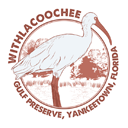
Air potatoes (Dioscorea bulbifera) are members of the yam family and are native to Asia and sub-Saharan Africa. Air potatoes can now be found throughout Florida and are considered an extremely aggressive invasive species. The vine was added to the Florida Department of Agriculture and Consumer Services’ Noxious Weed List in 1999.
A classic method of biological control involves finding an organism that feeds exclusively on the invasive plant and then releasing it in the invaded area. Once established the control agent will provide long-term suppression of the plant.
Scientists with the US Department of Agriculture identified a beetle (Lilioceris cheni) in Nepal and China that feeds on air potato leaves. There is now a program in Florida to use this beetle to control the air potato. If you have air potato on your property you can obtain beetles free of charge. To learn more about the program and instructions for ordering beetles visit
http://bcrcl.ifas.ufl.edu/airpotatobiologicalcontrol.shtml
The Friends want to thank Elise Schuchman (Florida Department of Agriculture) for coming out to the Preserve and giving an informative presentation on the invasive air potato vine, and efforts to control it.






 The Rescue Program responds to sick, injured, and deceased marine mammals in Levy, Dixie, and Taylor counties of the Big Bend. They coordinate rescues of live animals and, if possible, transport them to rehabilitation facilities. They also perform necropsies (animal autopsies) on deceased marine animals to determine their cause of death and learn more about their anatomy, physiology, and the health of their ecosystem.
The Rescue Program responds to sick, injured, and deceased marine mammals in Levy, Dixie, and Taylor counties of the Big Bend. They coordinate rescues of live animals and, if possible, transport them to rehabilitation facilities. They also perform necropsies (animal autopsies) on deceased marine animals to determine their cause of death and learn more about their anatomy, physiology, and the health of their ecosystem. The Audubon Society has a free, award-winning field guide app. Versions are available for Apple iOS, Android, and Amazon Kindle. To learn more visit:
The Audubon Society has a free, award-winning field guide app. Versions are available for Apple iOS, Android, and Amazon Kindle. To learn more visit:  The Friends of the WGP want to welcome a new chapter of the Audubon Society to Levy Country. Cedar Keys Audubon is the newest chapter in the Audubon Florida network. To find out more visit them at
The Friends of the WGP want to welcome a new chapter of the Audubon Society to Levy Country. Cedar Keys Audubon is the newest chapter in the Audubon Florida network. To find out more visit them at  The
The 
